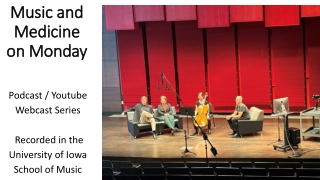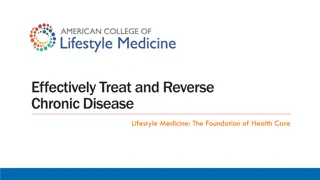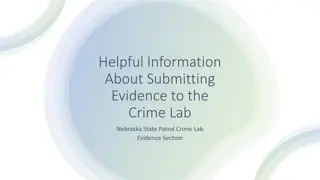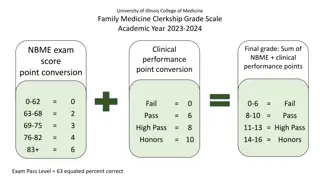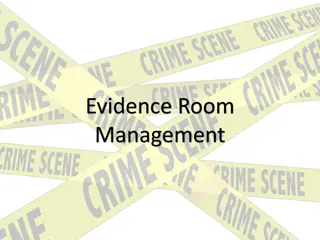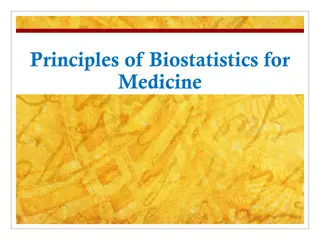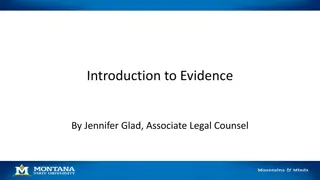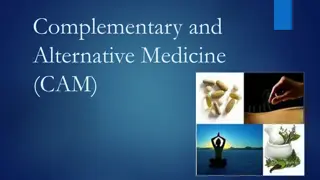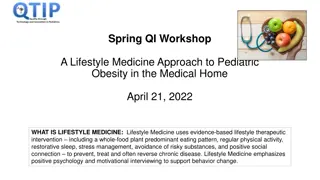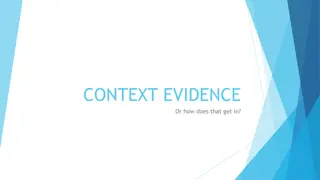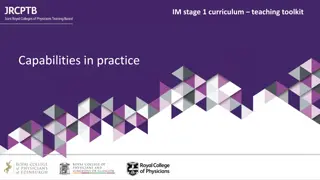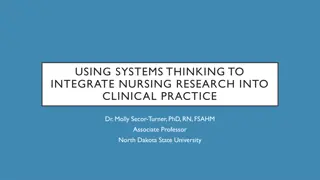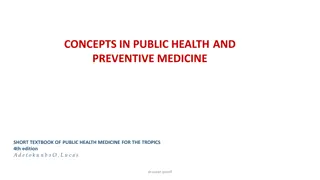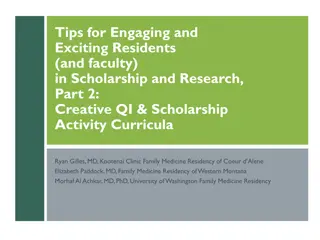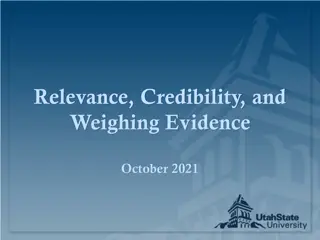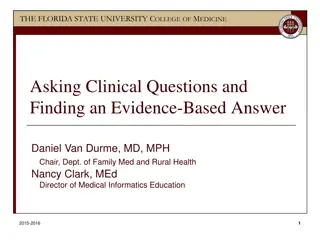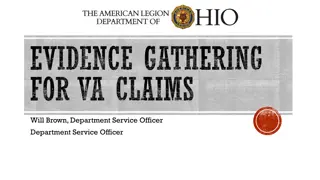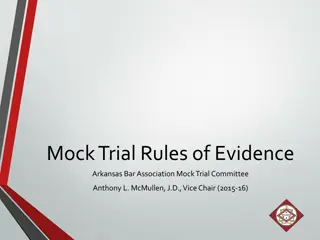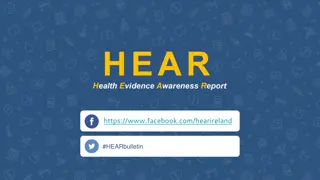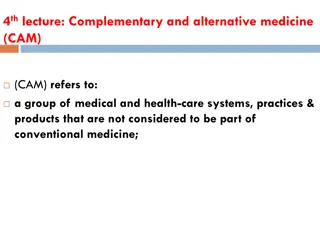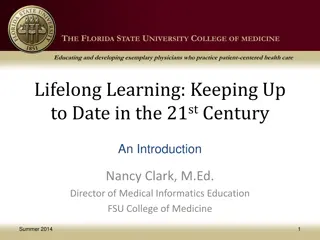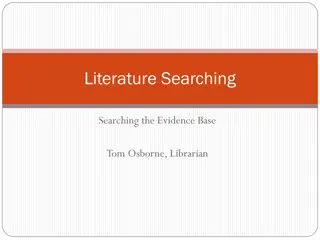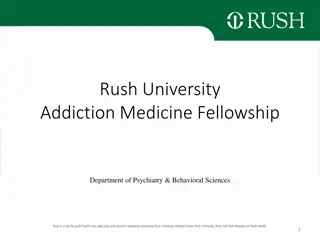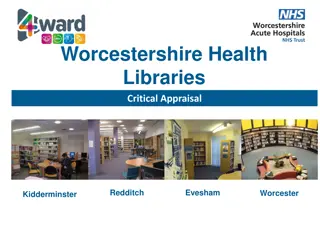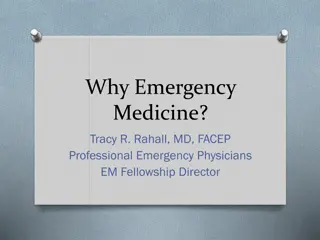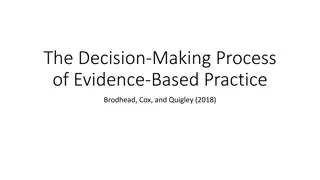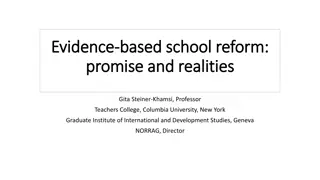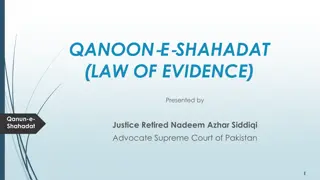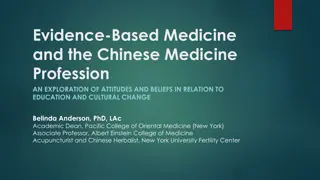Music and Medicine Medicine on Monday
Delve into the collaboration between the University of Iowa School of Music and School of Medicine with their podcast/webcast series "Music and Medicine on Monday." Each episode features discussions on various music-related health topics, performances by students, and insights from medical experts.
1 views • 12 slides
Lifestyle Medicine: A Foundation for Treating Chronic Disease
Lifestyle medicine focuses on using evidence-based lifestyle interventions to treat chronic conditions such as cardiovascular diseases, diabetes, and obesity. By emphasizing whole-food, plant-predominant eating patterns, physical activity, stress management, and other key pillars, lifestyle medicine
1 views • 9 slides
The Role of Artifacts and Evidence in Educator Evaluation and Support
Exploring the role of artifacts and evidence in educator evaluation, this content covers the three categories of evidence required by the Oregon Framework. It delves into the efficient process that reduces redundancy, essential components of SLG goals, and the types of evidence relevant to professio
0 views • 15 slides
Understanding Impression Evidence Collection in CSI Investigations
Impression evidence plays a crucial role in investigations, including shoeprints, tool marks, tire tracks, bite marks, and riffling marks on bullets. This evidence can be collected in 2D using photography or tape lifts, and in 3D through casting methods. Differentiating between class and individual
0 views • 21 slides
Helpful Information About Submitting Evidence to the Crime Lab.
Helpful information about submitting evidence to the Nebraska State Patrol Crime Lab's Evidence Section. Learn about the NSP 750 Evidence Submittal Form, submission process, and guidelines for resubmissions. Ensure all necessary details are provided for proper analysis of evidence.
5 views • 16 slides
Illegally obtained evidence
Illegally obtained evidence refers to evidence acquired through unlawful means, such as searches without warrants or extraction under duress. The Fruit of the Poisonous Tree doctrine renders evidence inadmissible if derived from illegally obtained evidence. The Exclusionary Rule prohibits the use of
2 views • 30 slides
Understanding Lifestyle Medicine: A Holistic Approach to Health
Lifestyle medicine is a medical specialty focused on using evidence-based lifestyle interventions to treat chronic conditions like cardiovascular diseases, type 2 diabetes, and obesity. Clinicians trained in lifestyle medicine emphasize whole-person care through nutrition, physical activity, stress
11 views • 10 slides
MD MS IN UK WITHOUT PLAB,PG MD MS IN UK
MD MS IN UK WI Internal Medicine without PLAB is a Three Years Full Time Hands on Training Program. The course constitutes hands-on training in all major clinical specialties e.g. Cardiology, Acute Medicine, Gastroenterology, Diabetes, Psychiatric Medicine, Stroke Medicine and Neurology and others,
7 views • 4 slides
University of Illinois College of Medicine Clerkship Grade Scales 2023-2024
Final grade scales for various clerkships at the University of Illinois College of Medicine for the academic year 2023-2024 are provided. The grading criteria include a combination of NBME exam scores and clinical performance points, with corresponding grade conversions ranging from Fail to Honors b
0 views • 7 slides
Evidence Room Management
Explore the intricacies of evidence room management in a law enforcement setting, including the roles of individuals like Greg Van Buskirk, differences in crime scene management between large and small departments, the distinction between property and evidence, the importance of maintaining chain of
0 views • 8 slides
Understanding Biostatistics in Medicine
Biostatistics is essential in analyzing medical and biological data to provide evidence for clinical decisions. It plays a crucial role in describing patients, evaluating treatment outcomes, and forming the foundation of Evidence-Based Medicine. By applying statistical methods, biostatistics helps i
1 views • 5 slides
Understanding Evidence in Investigations
Learn about the principles and types of evidence in investigations, including inculpatory and exculpatory evidence, physical, documentary, demonstrative, and verbal evidence. Explore sources of evidence and the significance of collecting relevant information to ensure a fair investigative process.
0 views • 14 slides
Understanding Complementary and Alternative Medicine (CAM)
Complementary and Alternative Medicine (CAM) encompasses various treatments, ranging from herbs to yoga, that differ from traditional Western medicine. While complementary medicine involves using these therapies alongside conventional medicine, alternative medicine opts for non-mainstream approaches
2 views • 20 slides
Lifestyle Medicine Approach to Pediatric Obesity in the Medical Home
Lifestyle Medicine uses evidence-based interventions like whole-food plant-based eating, regular physical activity, sleep, stress management, and social connection to address chronic diseases in children. Quality improvement ideas include promoting healthy habits, implementing lifestyle medicine-bas
0 views • 5 slides
Understanding Context Evidence in Legal Proceedings
Context evidence in legal proceedings refers to evidence of acts not charged in the indictment, used to provide a background for understanding specific allegations. This type of evidence is often relied upon by the prosecution to explain events or behaviors that may seem isolated or surprising. It i
1 views • 13 slides
Internal Medicine Stage 1 Curriculum Teaching Toolkit: Capabilities in Practice
Capabilities in Practice (CiPs) describe the professional tasks within the scope of internal medicine, utilizing expert assessors for assessment validity. There are 14 CiPs as learning outcomes for internal medicine Stage 1, with descriptors, performance levels, and evidence for entrustment decision
0 views • 11 slides
Integrating Nursing Research into Clinical Practice with Systems Thinking
Dr. Molly Secor-Turner emphasizes the importance of evidence-based practice (EBP) in nursing. EBP, derived from rigorous research, leads to quality patient outcomes by aligning services with current knowledge. The process involves identifying problems, critiquing evidence, implementing recommendatio
0 views • 21 slides
Understanding Concepts in Public Health and Preventive Medicine
The evolution of nomenclature in public health, from hygiene to preventive medicine and social medicine, reflects the collective efforts to prevent disease, prolong life, and promote health. Key elements of modern public health include collective responsibility, state intervention, prevention emphas
0 views • 16 slides
Understanding Evidence-Based Medicine and Clinical Decision-Making
European Patients Academy on Therapeutic Innovation emphasizes the importance of Evidence-Based Medicine (EBM) in providing optimum clinical care. EBM involves systematic review and utilization of clinical research for informed decision-making, benefiting patients in disease management and treatment
7 views • 20 slides
Enhancing Engagement in Scholarly Activities and Research in Family Medicine Residency Programs
Explore strategies and challenges in promoting scholarly activities and research participation among residents and faculty in family medicine residency programs. Learn about ACGME/RRC requirements, importance of research in primary care, and creative QI and scholarship curricula. Discover insights o
0 views • 25 slides
Understanding Relevance, Credibility, and Weighing Evidence in Decision-Making
Explore the importance of relevance and credibility in evidence assessment, the role of hearing panels in evaluating evidence fairly, and the responsibilities they hold. Learn about presenting relevant evidence, policy analysis, and identifying irrelevant evidence to ensure a thorough review process
6 views • 32 slides
Clinical Question Formulation in Evidence-Based Medicine at The Florida State University College of Medicine
Learn the essential steps in formulating clinical questions in evidence-based medicine at The Florida State University College of Medicine. Understand the distinction between background and foreground questions, PICO format, and the multi-step EBM process. Enhance your ability to find evidence-based
0 views • 22 slides
Mastering Claims, Evidence, and Warrants for Persuasive Writing
Understanding the concepts of claims, evidence, and warrants is crucial for constructing persuasive arguments. Claims represent positions to persuade, evidence supports claims with facts, and warrants bridge the gap between evidence and claims. An exercise is outlined to help practice forming claims
0 views • 8 slides
Understanding Biased Assimilation and Attitude Polarization in Social Disputes
People with strong opinions on complex social issues tend to interpret evidence in a biased manner, accepting confirming evidence readily while subjecting disconfirming evidence to critical evaluation. This can lead to increased polarization rather than narrowing of disagreement when exposed to the
0 views • 20 slides
Transformation of Quality Assessment Framework in Healthcare
The healthcare quality assessment framework is evolving with a new strategy focused on data-led, people's experiences, care integration, and safety culture. The current framework is transitioning towards a new approach by late 2023, incorporating separate registration and monitoring processes, five
0 views • 14 slides
Understanding Evidence Gathering for VA Claims with The American Legion Department of Ohio
Evidence is crucial for VA claims, and it can come in various forms such as documents, written statements, photos, and video recordings. The framework for evaluating evidence includes factors like relevance, competence, credibility, and weight. Understanding the types of evidence, forms of relevance
0 views • 14 slides
Understanding Mock Trial Rules of Evidence
Mock Trial Rules of Evidence are crucial for determining the admissibility of testimony and evidence in a trial setting. Students preparing for cases need to assess evidence admissibility, make timely objections, and be prepared to defend testimony. The rules cover objections, specific objections ty
0 views • 36 slides
Collaborative Efforts of Irish Health Librarians in Providing Evidence-Based Practice Support
Current awareness newsletter freely available on the internet, providing high-quality, relevant information to healthcare professionals and consumers. This collaboration of Irish health librarians aims to promote evidence-based practice by offering up-to-date information and resources. The conscient
0 views • 12 slides
Overview of Complementary and Alternative Medicine (CAM)
Complementary and Alternative Medicine (CAM) encompasses diverse medical practices, products, and systems outside conventional healthcare. CAM includes treatments like acupuncture, herbal remedies, and meditation. Epidemiological data shows widespread usage, particularly for conditions such as back
1 views • 20 slides
Education and Development of Exemplary Physicians at The Florida State University College of Medicine
The Florida State University College of Medicine is dedicated to educating and developing exceptional physicians who prioritize patient-centered healthcare. Emphasizing lifelong learning to stay updated in the ever-evolving field of medicine, the institution focuses on recognizing rapid changes and
0 views • 11 slides
Effective Literature Searching for Evidence-Based Medicine
Learn about effective literature searching techniques for evidence-based medicine, including library resources, search strategy development, access via OpenAthens, and utilizing the PICO approach for structured searches. Discover how to formulate searches, register for OpenAthens, and navigate libra
0 views • 15 slides
Rush University Addiction Medicine Fellowship Overview
One-year ACGME-accredited multispecialty training program at Rush University focused on providing care for individuals with unhealthy substance use, substance use disorders, and other addictive disorders. The program utilizes a public health approach to comprehend the social and economic determinant
0 views • 24 slides
Understanding Evidence-Based Medicine and Critical Appraisal in Healthcare
Dive into the world of Evidence-Based Medicine (EBM) and Critical Appraisal to enhance clinical care. Explore resources, learn to evaluate research, and apply the CASP framework for better patient outcomes. Discover why critical appraisal is essential and how to navigate the hierarchy of evidence in
0 views • 28 slides
Practice and Procedure in Judicial Review: Factual Evidence and Interveners
The content provides valuable insights into the practice and procedure regarding factual evidence and interveners in judicial review cases. It covers general rules, recent cases, applications for oral evidence, questioning witnesses, opinion evidence, and the role of interveners. Key points include
0 views • 28 slides
The Role of Family Physicians in Emergency Medicine: A Historical Perspective
Family physicians have played a crucial role in the development of emergency medicine as a specialty, with many physicians transitioning and contributing to the field. Despite some controversy surrounding their role, organizations like AAFP have supported family physicians practicing emergency medic
0 views • 22 slides
Integration of Complementary Medicine in Cancer Care in Tuscany
Describes the successful integration of Complementary Medicine in the network of Cancer Departments within the Tuscan Public Healthcare System. The initiative, spearheaded by experts in both Complementary Medicine and medical oncology, has led to the development of Regional Guidelines incorporating
0 views • 4 slides
Understanding Evidence-Based Practice in Behavior Analysis
Definitions and analogies from the field of medicine help clarify the concept of Evidence-Based Practice (EBP) in Behavior Analysis. EBP involves integrating current best evidence with clinical expertise and client values to make informed decisions. The three-legged stool analogy illustrates the imp
0 views • 32 slides
Structural Coupling between Science and Politics in Evidence-Based School Reform
This article by Gita Steiner-Khamsi explores the interplay between science and politics in evidence-based school reform, focusing on global public goods and the use of data and evidence in policy planning. It discusses the challenges and promises of evidence-based approaches, highlighting the comple
0 views • 17 slides
Understanding Qanun-e-Shahadat: Law of Evidence in Pakistan
Qanun-e-Shahadat Order 1984 replaced the Evidence Act of 1872 in Pakistan, aiming to align the law of evidence with Islamic principles. This law is crucial for judicial proceedings, governing the admissibility of oral and documentary evidence, primary and secondary evidence, and resolving conflicts
0 views • 22 slides
Attitudes and Beliefs in Evidence-Based Medicine within Chinese Medicine Profession
This exploration delves into attitudes and beliefs regarding evidence-based medicine in the Chinese medicine profession, examining education, cultural change, and perspectives of MD and PCOM students. It covers the history of PCOM-NY's research involvement, current research projects funded by organi
0 views • 26 slides
